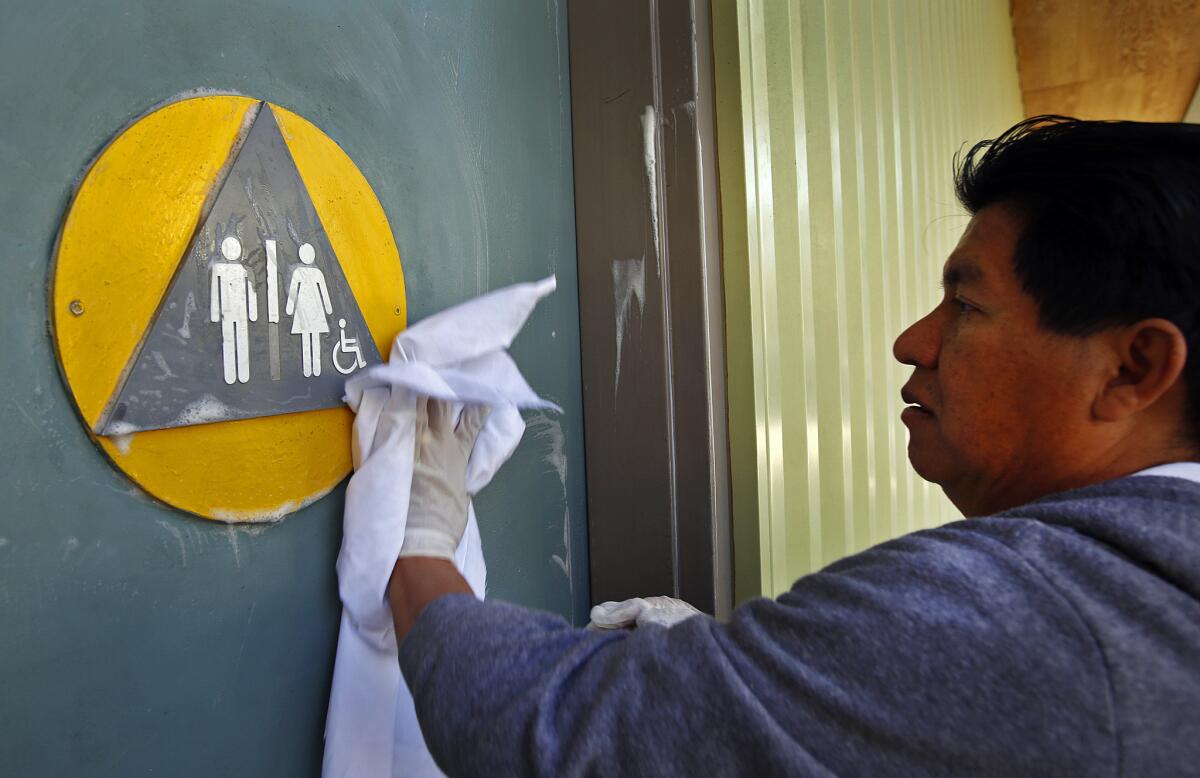In show of support for transgender people, Assembly acts to make single-user restrooms gender-neutral

Reporting from Sacramento — As other states restrict the ability of transgender people to choose which bathrooms to use, the California Assembly on Monday voted to make single-user restrooms in public and government buildings “all gender,” so that anyone can use any restroom.
Lawmakers also took initial action to prohibit taxpayer-funded travel to states whose policies are viewed as discriminatory to the transgender community.
Assemblyman Phil Ting (D-San Francisco) said his measure would make restrooms more convenient for women and for transgender Californians who may identify as a woman and feel uncomfortable using a restroom designated for men, and vice versa.
“While other states are making it tougher and more political to use the bathroom, today we can make it easier for everyone to use the bathroom by simply changing the sign on the door and allowing anyone to use it,” Ting said. “Today, let’s take the politics out of bathrooms and bring back common sense.”
The measure passed on a 52-18 vote after some Republicans objected to the change.
Assemblyman James Gallagher (R-Yuba City) said there is no problem with the status quo because people of any gender can currently use single-user restrooms. He said women will not want to use restrooms where men leave behind urine-stained toilet seats.
“We’re going to inconvenience a lot more people by doing this where right now under the status quo there is no inconvenience,” Gallagher said during the floor debate. “No woman wants to use the bathroom after many men have been in that same bathroom. As hard as we try, men, you know that your aim is not always that good.”
Assemblywoman Susan Talamantes Eggman (D-Stockton), who supported the bill, rejected Gallagher’s argument.
“I don’t think that because your aim is bad that makes you any kind of special category where you must have your own bathroom,” Eggman said.
Requested by the Transgender Law Center, the California National Organization for Women and Equality California, Ting’s bill is part of a national debate about whether restrooms should be gender-neutral, or designated men- or women-only.
Similar measures are being considered in New York and Vermont, and an ordinance was adopted by the city of West Hollywood. Meanwhile, legislation in Indiana would make it a misdemeanor to knowingly enter a single-user restroom designated for people of the opposite sex.
North Carolina is facing possible federal sanctions after enacting a law in March that requires people to use public restrooms that correspond with their gender at birth. The U.S. Department of Justice has determined HB 2 violates the Civil Rights Act of 1964.
------------
For the Record
8:34 p.m., May 9: An earlier version of this post said North Carolina enacted HB 2 last month. It was signed into law in March.
------------
In response to what is happening in Indiana and North Carolina, the California Assembly also voted Monday to prohibit state agencies from requiring employees to travel to states that are deemed to be discriminating based on gender identity or sexual orientation, and to prohibit using state funds for such travel.
Assemblyman Evan Low (D-Campbell) said he had North Carolina in mind in introducing AB 1887.
“California supports inclusiveness,” Low told his colleagues. “We need to use our powerful voice to say that we do not tolerate discrimination in any form of any kind.”
Both bills next go to the Senate for consideration. The restroom bill comes three years after California enacted a law allowing transgender students in California schools to use facilities, including restrooms and locker rooms, based on their gender identity rather than their sex.
California legislators also previously passed laws allowing transgender residents to change government documents to reflect their gender identity.
“By making single-user restrooms accessible to all genders, this law will make life easier for everyone and reduce the harassment regularly experienced by transgender people and others who don’t match people’s stereotypes of what it looks like to be a man or a woman,” said Kris Hayashi, executive director of Transgender Law Center.
The law, if signed by the governor, would take effect March 1, 2017, to give businesses and government building operators time to adjust signage.
The change makes sense given that there is already universal bathroom access on airplanes, said Jerilyn Stapleton, president of California NOW.
“When nature calls, women frequently have to wait,” Stapleton said. “We shouldn’t have to wait or postpone having our needs fairly met in public. Everyone should experience equal waiting time.”
Follow @mcgreevy99 on Twitter
ALSO:
Assembly approves bill on gender identity in schools
Measure to block transgender student law fails to make ballot
More to Read
Get the L.A. Times Politics newsletter
Deeply reported insights into legislation, politics and policy from Sacramento, Washington and beyond. In your inbox three times per week.
You may occasionally receive promotional content from the Los Angeles Times.











